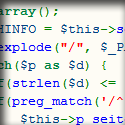|
I've got a question about creating new objects within generics. What I'm trying to do can be boiled down to this:code:code:
|
|
|
|

|
| # ? May 9, 2024 12:33 |
|
After type-checking is done, Java lowers generic types to non-generic types using an technique called "type erasure", which is pretty much exactly what it sounds like: a type parameter T extends B is erased to the (erasure of) B. So at runtime, that code has no idea what T was. The main technique for fixing this (if you really need to create new objects within generic code) is to pass in some object which is capable of creating an object of the appropriate type. Something like this: code:
|
|
|
|
Does anyone know how to rename a File object? What I'm trying to do is get the proper extension appended to the end of a provided filename. I've tried using the renameTo() function, but in my experience and from what I can see online, it has numerous issues especially on Windows platforms. I'm using a JFileChooser for my file dialog, here's a snippet of my code:code:
|
|
|
|
File is misnamed. A File object just represents an abstract filesystem path. JFileChooser is giving you the abstract filesystem path that the user chose to save the file to. file.renameTo(newFile) is literally trying to rename an existing file at the abstract path given by file to the new path given by newFile, which is why it fails when no such file exists. Files are immutable, just like Strings. If you don't like the path the user gave you, make a new File object and use it instead. In other words, do this: code:
|
|
|
|
rjmccall posted:File is misnamed. A File object just represents an abstract filesystem path. JFileChooser is giving you the abstract filesystem path that the user chose to save the file to. file.renameTo(newFile) is literally trying to rename an existing file at the abstract path given by file to the new path given by newFile, which is why it fails when no such file exists. Thanks very much, I appreciate this and I can't believe I overlooked such a simple solution. I had it in my head that I had to use renameTo(). I also didn't know that File is immutable, that's valuable information.
|
|
|
|
TRex EaterofCars posted:What's the fully qualified package for that class? I googled $$$setupUI$$$ and found a groovy project for the intellij ide here: http://www.jetbrains.net/jira/browse/GRVY-2045 Thanks for this. So it turns the project was in fact done using Intellij and that setupUI method was auto-generated by the IDE. I installed Intellij, put the files I had in a project and it looks like everything is working. I don't really get it, but I'm not complaining  . .
|
|
|
|
useless player posted:Thanks for this. So it turns the project was in fact done using Intellij and that setupUI method was auto-generated by the IDE. I installed Intellij, put the files I had in a project and it looks like everything is working. I don't really get it, but I'm not complaining Are you saying that Intellij is automatically generating a method (that is being called somewhere), and moving to a different IDE (or simple text editor) makes the code to not work anymore? Well...that's -5 points for intellij off the bat right there. That's moronic. The other -5 points of course come from the IntelliJ fans One should be able to compile a java project (any project) using simple command line javac anytime he/she wishes.
|
|
|
|
rhag posted:you need to get away from that GUI editor. It's so easy to write a nice UI in java, that using a GUI editor will only slow you down. quote:One should be able to compile a java project (any project) using simple command line javac anytime he/she wishes.
|
|
|
|
Mustach posted:This is terrible advice. Writing UIs in procedural code is the slowest, most tedious, most cumbersome, and most error-prone (a.k.a. gayest) way to do it. If there's not a markup language for it (and a lot of the time, even if there is one), a visual editor is the fastest way of coding an interface. Not in my brief experience. The GUI that I built using the visual editor was flimsy and had very strange bugs in it (buttons told to anchor to the bottom-left corner of the page would move away from it of their own accord). I coded it by hand and it is working flawlessly.
|
|
|
|
Mustach posted:Yes, let's teach beginners to stubbornly ignore all non-Sun libraries and tools like parser generators, etc. There are these things called JARS that you can include in your project. If your IDE is using some proprietary JARS that aren't being copied in the project folder, it sucks!
|
|
|
|
Mustach posted:Yes, let's teach beginners to stubbornly ignore all non-Sun libraries and tools like parser generators, etc. Instead, let's teach beginners to only compile things that have an <insert magic here> compile step and don't use a standard process. Nothing like some magic to teach them how to write quality software.
|
|
|
|
MEAT TREAT posted:There are these things called JARS that you can include in your project. If your IDE is using some proprietary JARS that aren't being copied in the project folder, it sucks! Tulenian posted:Instead, let's teach beginners to only compile things that have an <insert magic here> compile step and don't use a standard process. Nothing like some magic to teach them how to write quality software.
|
|
|
|
Mustach posted:-cp, among many other things Well..if you read the guys post, it seems like the IDE was autogenerating a function ($$$setup$$$), probably at compile time. This is hosed up, no matter how you look at it. Wanna use a GUI builder? Go ahead. Have fun. But that GUI builder better generate code, not fancy shmancy stuff that will break the second you move away from that IDE/GUI builder. Yes, you have to be able to use javac to compile a project. Would that be masochistic? Yes. But should you be able to do it, if you want to? You betcha.
|
|
|
|
How can I load my read-only Derby database distributed along with my program JAR? For a sound or image I'd use Class.getResource(), but nothing I've found implies that would work here. I've set Derby's temporary directory and log file to the system temp directory and chmoded the database folder read-only to make sure it works that way. It works perfectly when run from within Eclipse, but when I export my runnable JAR I get the "database not found" SQLException. My JAR is laid out like this: code:
|
|
|
|
rhag posted:Well..if you read the guys post, it seems like the IDE was autogenerating a function ($$$setup$$$), probably at compile time.
|
|
|
|
IntelliJ can generate "real" (Java) code too, but it defaults to creating .class files. It's a configuration option, but I don't remember if it's global or project-specific. Why, I don't know.
|
|
|
|
rhag posted:Well..if you read the guys post, it seems like the IDE was autogenerating a function ($$$setup$$$), probably at compile time. useless player fucked around with this message at 08:23 on Jul 21, 2009 |
|
|
|
I would like to make a Java program extensible by allowing people to write their own classes (derived from a pre-defined class) which I would then load in my program. That way, I'm hoping to make it possible to add certain features without having to recompile the entire program, or even having access to the code. So basically I'm looking for something like a DLL equivalent in Java. I think I read about something like this once, but I'm unsure on the details. Is there even such a thing in Java? How hard would it be to implement? What are some good starting points?
|
|
|
|
Fehler posted:I would like to make a Java program extensible by allowing people to write their own classes (derived from a pre-defined class) which I would then load in my program. That way, I'm hoping to make it possible to add certain features without having to recompile the entire program, or even having access to the code. Every class file is effectively a dll. A classloader like a URLClassLoader is used to load the class from a Jar file, then the class can be instantiated through reflection and used normally.
|
|
|
|
Fehler posted:I would like to make a Java program extensible by allowing people to write their own classes (derived from a pre-defined class) which I would then load in my program. That way, I'm hoping to make it possible to add certain features without having to recompile the entire program, or even having access to the code. I've done something like this once for a program of mine. Here is my approach to it (it can be done in a gazillion other ways, and half of them could be better than this): - specify a directory where the plugin jars have to be located (for me it was plugins/) - specify an information file that has to be in the .jar in my case , i was looking for an xml file,named plugin.xml, that contained information about what kind of modifications that plugin wanted to make and what classes to load. Something like: Add menu item with text "X", on user click invoke action package1.package2.YourActionClass . Of course, you can define whatever you want. - Load up the class using a class loader. In my case I wrote my own, extending the JarClassLoader. The only reason I did that was that I looked in a specific directory for the .jar's, .jar's that normally would not be in the classpath - Create an instance of the class, and invoke method Y Hope this helps.
|
|
|
|
Thanks for the suggestions with the XML, but since it will always just be one single class that needs to be loaded, I think I should be fine with a simpler approach. My concept so far is that the user puts a file extensionName.jar in a special folder and in my program for every .jar in the folder, I try to load a class called "org.me.extension." + extensionName. Here is my code for that (file is a File object): code:java.lang.ClassNotFoundException: org.me.extensions.TestClass at java.net.URLClassLoader$1.run(URLClassLoader.java:200) Any ideas why? I don't even know how I would go about debugging this...
|
|
|
|
My first guess would be that the TestClass.class file is in the root of the TestClass.jar and not in org/me/extension. If that's not the case, I'd start debugging by using a JarInputStream to make sure the .jar is good. Maybe compare to a known good .jar.
|
|
|
|
I've got a bunch of tasks that need to get done (download some files and do some processing on them) and I'd like these to happen concurrently so I've been using a ThreadPoolExecutor and just shoving Runnables at it. Is there any sane way to have some tasks go to the front of the queue instead of the back (i.e. cutting in line?). There are two ways I've thought to do it: 1) have two ThreadPoolExecutors, one a normal one and one a 'priority' one and put all of the cutting tasks in the priority one 2) have a separate thread that keeps two queues, a normal and priority and continually monitors the ThreadPoolExecutor and gives it the correct job when it's needed. Is there a better approach here?
|
|
|
|
CoasterMaster posted:I've got a bunch of tasks that need to get done (download some files and do some processing on them) and I'd like these to happen concurrently so I've been using a ThreadPoolExecutor and just shoving Runnables at it. Is there any sane way to have some tasks go to the front of the queue instead of the back (i.e. cutting in line?). There are two ways I've thought to do it: FileRetriever implements Runnable, Comparable PriorityBlockingQueue<FileRetriever>
|
|
|
Is there a good way to figure out what is wrong with the html I am trying to render as a PDF with Flying Saucer and ITextRenderer? I have to deal with these issues every now and then and it's always a pain trying to figure out what it's throwing up on when I get a stack trace like:code:
|
|
|
|
|
fletcher posted:Is there a good way to figure out what is wrong with the html I am trying to render as a PDF with Flying Saucer and ITextRenderer? I have to deal with these issues every now and then and it's always a pain trying to figure out what it's throwing up on when I get a stack trace like: Run it through an online validator like the one at http://validator.w3.org/ ? Alternatively, if it's a local file and you don't want to upload it, install the Firefox HTML validator plugin http://users.skynet.be/mgueury/mozilla/
|
|
|
|
Dumb question about decimal approximations with double variables used to be here. Thanks quadreb! Pump-Action Gerbil fucked around with this message at 10:37 on Aug 1, 2009 |
|
|
|
Pump-Action Gerbil posted:Hello, I am just getting started in Java. Simply, it comes down to the inability of binary to accurately represent the numbers.
|
|
|
|
quadreb posted:Simply, it comes down to the inability of binary to accurately represent the numbers. Thank you very much. I managed to find a couple articles about this, I will check them out now.
|
|
|
|
I don't know what you original question was but I'm pretty sure it could be fixed by a fixed place decimal class. Java also has the BigDecimal class which is part of the standard library and could probably serve your needs. Just keep in mind that working with theses classes is slower than their primitive counterparts (float, double).
|
|
|
|
MEAT TREAT posted:I don't know what you original question was but I'm pretty sure it could be fixed by a fixed place decimal class. Java also has the BigDecimal class which is part of the standard library and could probably serve your needs. Just keep in mind that working with theses classes is slower than their primitive counterparts (float, double). Something similar to C#'s decimal primitive would be useful. Tracking down small rounding errors with doubles and floats is a huge pain in the rear end.
|
|
|
|
dealmaster posted:Something similar to C#'s decimal primitive would be useful. Tracking down small rounding errors with doubles and floats is a huge pain in the rear end. I work in the financial industry and we don't even care for internal reports. It's only when you're doing critical code that handles real money transactions that it's really an issue. Most people can just cut it off at output time to whatever precision they want or the horrible, horrible hack: code:baquerd fucked around with this message at 18:32 on Aug 1, 2009 |
|
|
|
dealmaster posted:Something similar to C#'s decimal primitive would be useful. Tracking down small rounding errors with doubles and floats is a huge pain in the rear end. That's all BigDecimal is, the only dumb part is the lack of operator support for that and BigInteger (or all subclasses of Number, honestly). JDK7 was slated to bring operator support for that but, alas, it wasn't meant to be 
|
|
|
|
quadreb posted:I work in the financial industry and we don't even care for internal reports. It's only when you're doing critical code that handles real money transactions that it's really an issue. Most people can just cut it off at output time to whatever precision they want or the horrible, horrible hack: Yeah, the only reason I encountered it was when I was writing the back-end for some life insurance code. Even a penny difference on a 6 or 7 figure settlement or policy would have to be tracked down. It was a monstrous pain in the rear end until I found out that decimal existed. Oh and yeah, that rounding trick doesn't work all the time. TRex EaterofCars posted:That's all BigDecimal is, the only dumb part is the lack of operator support for that and BigInteger (or all subclasses of Number, honestly). JDK7 was slated to bring operator support for that but, alas, it wasn't meant to be Yeah it's just too bad there's no primitive that'll do it, but at least they built the functionality into one of their standard library classes. It's just easier for actuaries and non-coders to look at: code:code:
|
|
|
|
dealmaster posted:Yeah it's just too bad there's no primitive that'll do it, but at least they built the functionality into one of their standard library classes. It's just easier for actuaries and non-coders to look at: You could always use Groovy. By default fractional numbers are BigDecimals: code:code:
|
|
|
|
I'm running out of heap space. To be fair, I'm throwing around a whole lot of aHugeFuckinArrayDeque.clone()'s, but I try to make sure I call aHugeFuckinArrayDeque.clear() before I do that, so I shouldn't have any more than two copies at a time (which I have more than enough RAM for). Without looking at my rats' nest of code, would you suspect that I'm failing to clear out something somewhere, or is it just Java failing to do garbage collection appropriately? Java's tutorial just says something like "The garbage collector does its job automatically when it determines that the time is right," which isn't really helping me understand what's going on.
|
|
|
|
There are three possibilities: 1. You have a memory leak. In a GCed environment, this means that you're preventing something from getting collected by holding a reference to it when you don't mean to. We can't help you debug this without looking at your "rats' nest of code", which I assure you no-one wants to do. Try a memory profiler. 2. You're actually doing something which requires a larger resident set than you've configured Java with. I think the default on many platforms is something dinky like 64MB. You can bump this up from the command line (or by configuring your IDE, if you're using one). 3. There's a bug in the garbage collector. This is almost certainly not the problem — not that there aren't bugs in the collector, just that you are very unlikely to be running into one.
|
|
|
|
It's most likely your code. For example, ArrayDeque.clear() is not likely to reduce the capacity of your aHugeFuckinArrayDeque, so if you're holding a reference to the objects somewhere else, calling it is not going to make any memory eligible for garbage-collection.
|
|
|
|
rjmccall posted:1. You have a memory leak. In a GCed environment, this means that you're preventing something from getting collected by holding a reference to it when you don't mean to. We can't help you debug this without looking at your "rats' nest of code", which I assure you no-one wants to do. Try a memory profiler. Okay, that's about what I figured. I'm going to start sifting through the code - someone else wrote an extension to my class, and we're both blaming each other for the fuckup. (Of course.  ) Thanks. ) Thanks.Ninja Edit: He forgot to set an upper bound to turn on infinite-loop detection, and I failed to pick up on it till now.
|
|
|
|

|
| # ? May 9, 2024 12:33 |
|
I'm trying to create a class that keeps track of different types of costs that a system might incur. (Examples might be time taken, money spent, and incorrect solution penalties.) I'm writing the abstract/template class, and my users need to be able to define their own cost categories at (their) compile time. I thought a good solution would be to have them create an Enum of different cost types, as it would save both time and memory over having cost types represented as strings. I'd like to create my class using generics, but I'm a bit unsure how to proceed.code:code:
|
|
|

























